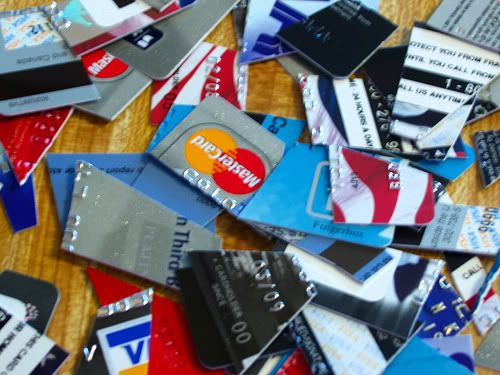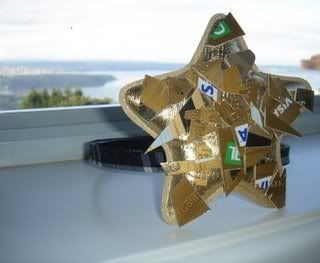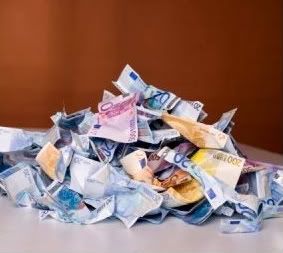 I know what you're saying: cash is old-fashioned. You get points and rewards and all kinds of cool stuff when you use your credit cards. Someone might even steal your cash. Television commericials actually try to convince you that you can hold up entire lines of people when you don't use your cool, modern, swipeable plastic cards.
I know what you're saying: cash is old-fashioned. You get points and rewards and all kinds of cool stuff when you use your credit cards. Someone might even steal your cash. Television commericials actually try to convince you that you can hold up entire lines of people when you don't use your cool, modern, swipeable plastic cards.But what does it really cost you to use plastic?
If you're like me, you used your credit cards responsibly for awhile. You paid off the balance in full and on time. This, I eventually realized, made me a lousy customer in the eyes of my creditors. They kept extending my credit lines. It didn't matter that my job situation hadn't changed--I was still making the same $20,000 a year as always. But suddenly it wasn't $2,000 of credit I had, it was $5,000. Then $10,000. I hadn't even asked for it. (This was in the early 1990s. Now they probably wouldn't even care whether I had a job or not.)
Yay, me! So much credit! And then...something happened. I started using that credit--more than I could pay back in a month. Now I was a good customer for those credit card companies, because suddenly those low introductory rates vanished, my interest was high, and I could barely pay the minimum I owed each month. Now they were making some money on me.
The more I owed, the more I despaired. And the more I spent. Once I owed more on my cards than I could imagine paying back, it didn't matter to me anymore how much I spent. I had lost control, seemingly without even realizing it. So I maxed out one card. And then another. Eventually, I owed more than I made in a year. Quickly it became an absolute financial and emotional disaster.
 I didn't stop using my credit cards by choice. In 1996 I was forced (as you might imagine) to stop using credit altogether. (In another post I'll talk about what I had to do about all the debt I was in.) And I suddenly found myself terrified to go out of the house without the plastic. I mean--what if there was an emergency?
I didn't stop using my credit cards by choice. In 1996 I was forced (as you might imagine) to stop using credit altogether. (In another post I'll talk about what I had to do about all the debt I was in.) And I suddenly found myself terrified to go out of the house without the plastic. I mean--what if there was an emergency?In thirteen years, I can assure you that I have never had an emergency that required a credit card. Never. Not in a car, not on public transportation, not in the city, not in the country. Not while driving or walking or travelling at home or abroad. Not once.
I'm also more cautious with cash than with credit (or even my debit) cards. Somehow, I think more carefully before spending actual dollars than I ever did swiping that card and just signing on the dotted line.
So what to do about the Plastic Attack?
1. Leave the plastic at home. ALL of it--every single credit card, and your debit cards, too.
2. Use cash. Only cash, every time, all the time. You'll never spend more than you have, and you'll more carefully consider how you spend it.
3. Make a list, and take only the cash you need for what's on the list for your daily shopping. If you worry about carrying too much cash on you, this is also the best strategy.
4. "What if there's an emergency?" In my personal experience, the "possible emergency" is no excuse to carry plastic. (Be honest with yourself. What emergency are you worried about--an amazing bargain you can't resist?) In this age of cell phones, this seems an even flimsier argument. But if you're really panic-stricken, put an envelope in your car with just enough money (or a pre-paid debit card) for a tow in it (say, $100) and leave it there. Now forget about it. It is for Emergencies Only.
5. Consider cutting up your credit cards. Yes, really. And don't forget to delete your info from all the places on the internet that also have your credit card information--Amazon, eBay, that amazing yarn shop you like to order from--to name a possible few. You don't get to keep using the card number after you cut up the physical card!
 As ozkatt mentioned on October 25, a good financial advisor suggested cutting up her credit cards--and she did, even though it was painful. This makes sound financial sense. If you don't have it, don't spend it--which is really the whole point of this blog. And one of the best ways to do this is to leave the plastic behind and use cold, hard cash.
As ozkatt mentioned on October 25, a good financial advisor suggested cutting up her credit cards--and she did, even though it was painful. This makes sound financial sense. If you don't have it, don't spend it--which is really the whole point of this blog. And one of the best ways to do this is to leave the plastic behind and use cold, hard cash.



